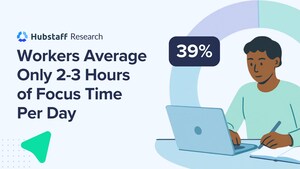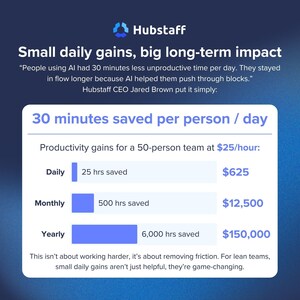
Hubstaff's Global Freelancing Study Reveals Groundbreaking Data on Freelancing Industry's Top 1%
Comprehensive study focuses on finding better clients, setting higher rates, and landing more gigs from 15000 freelancers
INDIANAPOLIS, July 11, 2017 /PRNewswire/ -- Hubstaff just released their first annual freelancing trends study. The study set out to provide insightful data on pay rates, work experiences, factors that help freelancers land gigs, signs a client relationship isn't going to work out, and much more. Data was collected via Hubstaff Talent's network of over 20,000 freelancers as well as interviews and surveys from more than 300 top-rated freelancers amongst nearly a dozen different industries.
Most notable insights from the study include:
Location plays a major role in average hourly rates: Freelancers in Great Britain command the highest average rates (more than $46 per hour), and those in the Philippines earn the lowest average hourly rates (less than $12 per hour).
Highlighting your work on a business or personal website helps you charge more: Freelancers with websites who work 40 hours a week earn nearly $28,000 more annually than full-time freelancers without websites.
Experience factors into the rates freelancers charge: Marketing industry freelancers with fewer than two years experience earn an average of $17 per hour, but those with more than ten years of experience earn an average of $52 per hour.
When it comes to landing freelance gigs: Prospects that come through referrals were by far the most likely to convert to clients at 30%.
When asked what signs to look for to identify bad clients: The number one response was clients that ask for too many revisions (40%). Asking for a discount is another bad sign (26%), as is requesting too many meetings (12%).
"I've seen and read multiple freelance studies that are out there," said the study coordinator and Hubstaff's Growth Strategist, Madhav Bhandari. "Most of the studies talk about freelancing from a more higher-level perspective like where the industry is heading, how much money this industry contributes to the economy, etc. That's fluff to me, as a freelancer. I wanted to get actionable insights on how the top 1% freelancers are finding better clients, charging higher rates and landing more gigs, so I can implement that advice today. And that's what I did."
Hubstaff's freelancing study contains eight sub-sections that cover a wide range of topics as well as an easy to share infographic that summarizes all the important findings.
Here's a short summary of what the study concluded from the data:
- Freelancer's rates vary wildly by amount of experience, location, and specialty, so there's no real standard to refer to. It is important to set a rate that is reasonable for the services provided.
- Having a place to promote and showcase work is critical. Freelancers with websites and developers with GitHub profiles make significantly more than those who don't have websites. Additionally, freelancers are more likely to get jobs when clients research their background and qualifications thoroughly. Giving clients a place to research previous work, and a means to get in touch will likely lead to more gigs and more money.
- An early agreement on rates is crucial. If a freelancer's rates aren't in line with a client's budget, the chances of landing the gig are minuscule. Being transparent with rates is important, listing them on a website or third party portfolio can be helpful. This will also help early identification of clients who intend to ask for a discount, allowing freelancers to end those relationships before they begin.
- Long-term and recurring projects are the most profitable. Efforts should be focused on finding clients seeking ongoing work. This helps reduce the waste associated with having to look for new clients and jobs. Additionally, long-term clients are more likely to show their appreciation by referring others. Prospects who come through referrals are most likely to convert to clients.
To see further insights and view the study in its entirety, please visit here. For press queries, please send an email to [email protected].
About Hubstaff:
Hubstaff was founded in 2012 by Dave Nevogt and Jared Brown, two entrepreneurs from Indianapolis, Indiana. They were using remote freelancers and wanted a better way to manage them. Their time tracking software is built by a small team spread across the globe and the company's office space is virtual. Hubstaff is actively used by over 8,000 agencies, freelancers, website owners and virtual teams all over the world. Hubstaff Talent was launched in July 2016 as a way to connect businesses and freelancers - the website sets itself apart from the rest by being completely free, no fees and no markups.
Related Images
Related Links
Related Video
http://www.youtube.com/watch?v=CJ6TjHoryzo
SOURCE Hubstaff






Share this article